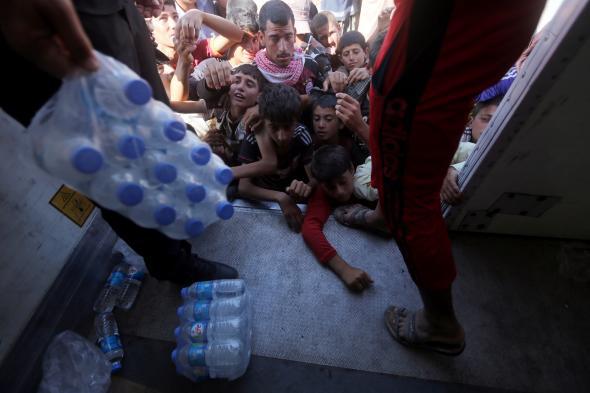The Pentagon on Tuesday sent 130 more military advisers to Iraq, bringing the total number of American military personnel currently on the ground there to more than 1,000, according to the New York Times’ count. In making the announcement, Defense Secretary Chuck Hagel was careful to stress that the decision to put more American boots on the ground in Iraq wasn’t the same as a “boots-on-the-ground operation,” and senior officials speaking to the Times on background likewise suggested the latest batch of advisers could be in Iraq for less than a week. “We’re not going back into Iraq in any of the same combat mission dimensions that we once were in in Iraq,” Hagel said.
The advisers are Marines and Special Operations Forces, according to the Defense Department. They were sent to the Kurdish capital of Erbil to assess the situation in the Sinjar area, where thousands of displaced Yazidis have been stranded with little food or water by the Sunni extremists fighting under the banner of the Islamic State of Iraq and Syria. But while Hagel echoed President Obama’s weekend promise that there would be no new U.S. combat operations in Iraq, senior officials were quietly suggesting that that might not be exactly the case.
One unnamed official told the Associated Press that while the new troops weren’t being sent as part of a rescue mission for the Yazidis, they would, in the wire’s words, “assess the feasibility of a rescue or what one might look like.” The Times’ sources (again, unnamed) likewise suggested that American officials “have become increasingly convinced that a humanitarian corridor will have to be established soon, with troops on the ground to help ensure safe passage for the displaced.” The Wall Street Journal, meanwhile, took such talk to its logical end, reporting that the Obama administration is “weighing a military mission in Iraq to rescue thousands of Yazidi refugees,” a decision that “risks putting American forces in direct confrontation with Sunni fighters for the Islamic State.” [Update, Aug. 13, 10 p.m.: Pentagon officials now say that recent gains make a rescue effort far less likely.]
As surprising as a headline like “U.S. Weighs Iraq Rescue Mission to Save Yazidis” might sound, it would be more surprising if military officials weren’t at least entertaining the possibility. It should also be noted that these are administration officials talking on background about things being discussed behind closed doors. The early results of this week’s intervention have been largely positive, with the airstrikes slowing the advances of ISIS, and Iraqi helicopters rescuing scores of refugees during their own airdrop missions. So there’s at least a chance that the status quo might get the job done. That said, a rescue mission looks possible, especially given Tuesday’s arrival of 130 Marines and special ops forces and anonymous quotes like this one: “People are looking at ways to do something more than just drop water and supplies. … You can only do that for so long.”
Obama and his surrogates have gone to great lengths to make the case that the current U.S. intervention in Iraq is (and will be) nothing like the eight-year war that cost more than 4,400 American lives. But, obviously, any type of direct clash between U.S. soldiers and ISIS forces would mark the return to something that looks an awful lot like a combat role roughly three years after the last U.S. combat troops left the country. As Sam Brannen, a senior fellow at the Center for Strategic and International Studies who worked in Obama’s Pentagon, explained to the Journal, even a targeted rescue operation carries serious risks. “This to me represents a dramatic escalation,” he said, “and I think it deserves a little bit of thought to avoid exactly a Black Hawk Down situation, where you think you’re there for humanitarian reasons and suddenly you’re there for a civil war.”
It’s not only a military risk, of course; it would also be a political gamble back home. The Defense Department’s current airstrike and aid-drop efforts have mainly been received positively from both parties in Congress. A rescue operation, however targeted, might change that, especially if it included a direct confrontation with ISIS fighters. It could also be particularly difficult to sell given the lengths the White House has gone to to rule one out. “American combat troops will not be returning to fight in Iraq,” President Obama said this past weekend, “because there’s no American military solution to the larger crisis there.” It’s that last clause that the White House will no doubt point to if they do launch a short-term rescue effort.
More Slate coverage of Iraq:
- Fred Kaplan: The Case for Helping the Kurds
- Josh Voorhees (hey, that’s me!): Iraq’s Maliki Thinks He Can Ignore the Country’s Constitution. After All, He’s Done It Before.
- Voorhees: Think Things Are Bad in Iraq Now? If There’s a Coup, They Will Get Much, Much Worse.
- Joshua Keating: What You Need to Know About the Likely New American Intervention in Iraq
